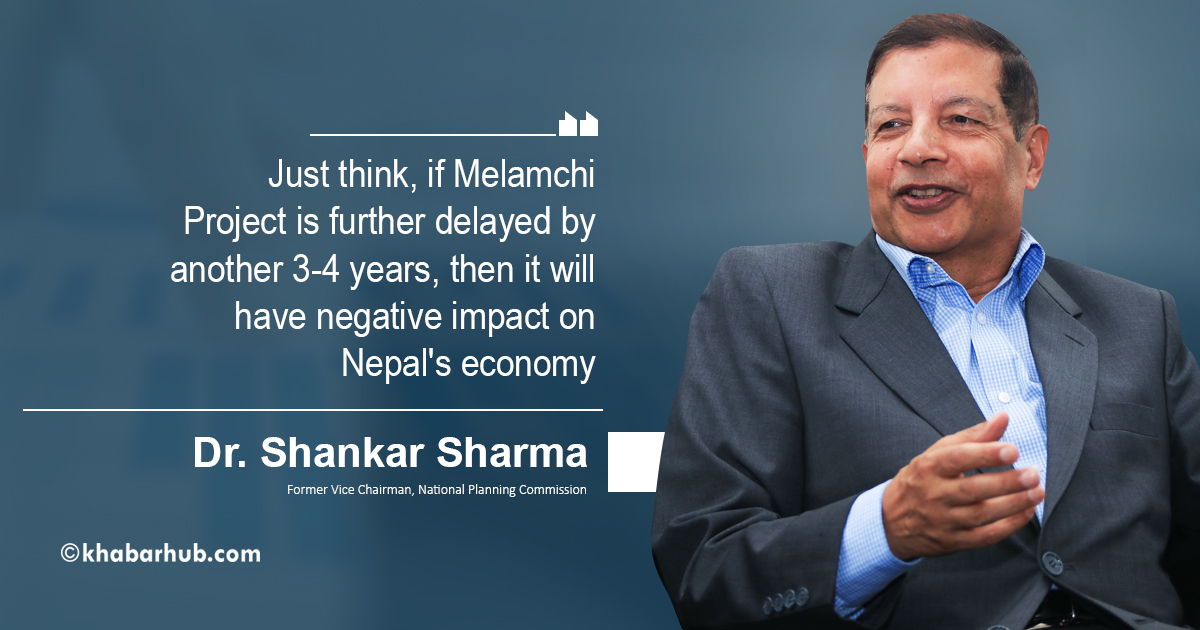0%

KATHMANDU: The government of Nepal, in the current financial year, is bent upon checking the spread of informal economy with a view to collecting more revenue to inflate the state treasury. This is why provisions like compulsory PAN (Permanent Account Number) and VCTS (Vehicle and Consignment Tracking System) are being introduced.
However, traders and businessmen have begun to oppose these initiatives even before they are brought down to the real ground by executing them. After the traders and businessmen announced their nation-wide movement to oppose the government’s move of PAN and VCTS, the Ministry of Finance promised to look into the practical problems and challenges involved in these two initiatives by forming a study committee of 5 members.
Execution of PAN and VCTS in business and financial transactions will take place only by taking all the suggestions and recommendations put forth by a study committee mentioned above. Khabarhub engaged with Dr. Shankar Sharma, an economist, in a tête-à-tête to take stock of all that is happening in both the domestic and international economy in light of implications of recently announced fiscal and monetary policies of the government. Excerpts:
New financial year has already begun. As it is being said that the government is already on its stated agenda of implementing all the policies and programs announced earlier. However, doubts are being raised from different quarters with regard to the real motive of these policies and programs. What do you feel about it all?
Revenue being the major source of the national economy play a crucial role in disbursing the fund for all the current and capital expenditure. At present, Nepal has a limited source of revenue collection barely sufficient to take care of its current expenditures (short-term spending).

Even this becomes challenging when an increase in salary of the government employees, various kinds of social security schemes and political promises such as providing jobs to 5 hundred thousand youth put a lot of strain on a limited stock of revenue to meet the excessive expenditure.
The present state of things is not cozy for our economy as the present available source of revenue needs to be expanded more. A total of 25% contribution to Gross Domestic Product (GDP) comes from revenue collected by the government. In the present scheme of things, it is very difficult to add on (or expand) extra sources of revenue.
The collection of VAT is already under scanner as lapses are being reported at a regular basis. Not all the employees are paying income tax and among those who are paying it are not following the slabs honestly. Cases of tax-theft are all rampant. With all the malaise being reported in the area of revenue-collection, its contribution to GDP to the extent of 25% is no way a mean achievement for a country.
Looking at the budget of the current financial year, it appears that the government is targeting debt expenditure for funding the development projects. Do you think it is possible in our country?
Development projects under the capital expenditure are dependent upon funding from foreign donors to some extent. More particularly, ADB (Asian Development Bank) and WB (World Bank) have ramped up their assistance to us considering more than one reason. One of the most important reasons is having a stable government in Nepal.
Another reason is the reduction of numbers of poor countries and hence Nepal is getting favor from ADB in terms of financial loans and other developmental assistance. Our neighbors, China and India, used to take loans from ADB not so long ago. Now they are self-sufficient so stopped taking loans from ADB.
Not many countries like Nepal queue up in front of ADB to seek loans and this is the reason a poor country like Nepal has fallen under a priority list of multilateral financial institutions at regional and world level such as the ADB. Another reason as I think is the gradual reduction of the burden of foreign debt in Nepal. The estimated amount of foreign debt at present stands at somewhere 30% of the total GDP of Nepal.
If you go back some 12-13 years ago, foreign debt covered a staggering amount of 67-68 percent of the total GDP of the country. Because of the reduction in the share of foreign debt, the government has no objection in engaging in developmental work within the country by drawing loans of whatever amount from financial institutions.
Nowadays, Nepal does not attract many grants but foreign donors are always ready to oblige us by extending debts at varying rates. What has put us in a financial soup at the moment is that we never prioritized the lists of expenditure through debt-money and left the top-listed projects unattended by diverting the money towards something else. We never bothered to complete the developmental projects funded by debt-money within a deadline, take the example of the Melamchi Drinking Water Project.
From the viewpoint of economics, if a project gets delayed by extending the deadline time and again, benefits and returns accruing from a project go on decreasing over the years. Just think, if the Melamchi Project is further delayed by another 3-4 years then it will have a negative impact on Nepal’s economy.

Just see what happened last year, the government couldn’t spend more than 74-75% of its capital expenditure. We are not sure when projects of national importance will get completed. We are caught by a disease of not completing development projects within specified time — a declared deadline.
We have adopted federalism and also created the federal structure in each of the five provinces along with local self-government. Creating a federal structure of such a size and scale incurs expenditure. There are again mountains of other expenses in various other unproductive areas. Do you think we shall be able to bear this level of expenditure by taking debts?
You know there are still many countries like Venezuela who cannot even take debts. At least, we are able to take debts for whatever reasons. Compared to other poor countries, Nepal has a better record of revenue collection. But, the monthly bulletin of Nepal Rastra Bank shows increasingly increasing trade-deficit. This is, of course, an area of concern for all of us. Nepal is also witnessing a gradual decrease in ‘foreign currency reserve’. This bodes a bad sign of our state of the economy.
Nepalese citizens have great expectation from the present government having the strength of 2/3rd majority in the Parliament. Somehow till today, the government has not been able to perform the way people wanted them to thereby inviting all-round political criticisms. How do you evaluate the performance of the government from an economic viewpoint?
Even from an economic viewpoint, one cannot give a high grade to the performance of the present government. Nevertheless, we see an upward rise in GDP despite the fact that there is no revision in the GDP growth of 6% for the last three years. This optimism in GDP is all due to the rise in agricultural activities in Nepal thanks to favorable seasons, less hours of load-shedding and reconstruction of houses and infrastructure in the post-earthquake period among others.
The country is still lacking a proper base of an economy. At present, high remittances along with revised growth rate of GDP are signs of encouragement for Nepal’s economy. There is a note of caution, however. The government records show the decreasing numbers of Nepalese workforce going for foreign employment. At the same time, reconstruction work in post-earthquake phase will not continue more than a year now. This is where gross demands will take a plunge to slide the economy down.
Some of the new provisions recently introduced in the current financial year by the Government of Nepal and talk of double-taxation are upsetting the trading and business community of Nepal. Traders and businesspersons are accusing the government of spoiling the country’s economy. They are up in arms opposing the government. How do you assess the recent moves of the government? Will it affect Nepal’s economy?
Geographically, Nepal shares its boundary with China in the north and India from the other three directions. Both China and India are in competition economically to become the number one economy in the world. This is really good news for Nepal. But, we seem to be caught somewhere else as there is no industrial base in Nepal as we speak together at the moment.
At the top of it, traders and businesspersons are already unhappy with the government because of its recently unveiled policies. We are not a big economy like India and the government of Nepal must not forget the local specifics along with inherent vulnerabilities within the country before devising policies and launching the same in one go by a single stroke, cautions the Nepali industrialists.
Coming to PAN issue, anyone engaging in a transaction of Rs 1000 or more must show PAN and quote PAN number. We tend to forget that the Nepalese market has a mix of both Indian and Nepalese workers. Leave aside Indian workers, even all the Nepalese workers do not have PAN card with them to show every time transaction of Rs 1000 is made. Well, I don’t doubt the intention of the government but the way it is being implemented just in one go has created a storm in Nepal. Without creating a proper base in a phase-wise manner, such schemes must not be attempted to implement in a half-baked manner.
Next thing is all about imposing same taxes at different levels on goods, services and persons by the government at all levels say federal, provincial and local have given rise to disincentives for all – general people, traders, businesspersons, and industrialists. They are paying the same tax twice and thrice with nobody to listen to as the government at all the levels are busy collecting taxes disregarding all the cannons of taxation.
For example, big industries registered with the federal government are being pressured by the provincial and local governments to pay taxes. This problem has assumed a serious proportion right now. In case the government postpones the solution of this problem by another one or two years, it will take a disastrous turn for sure.